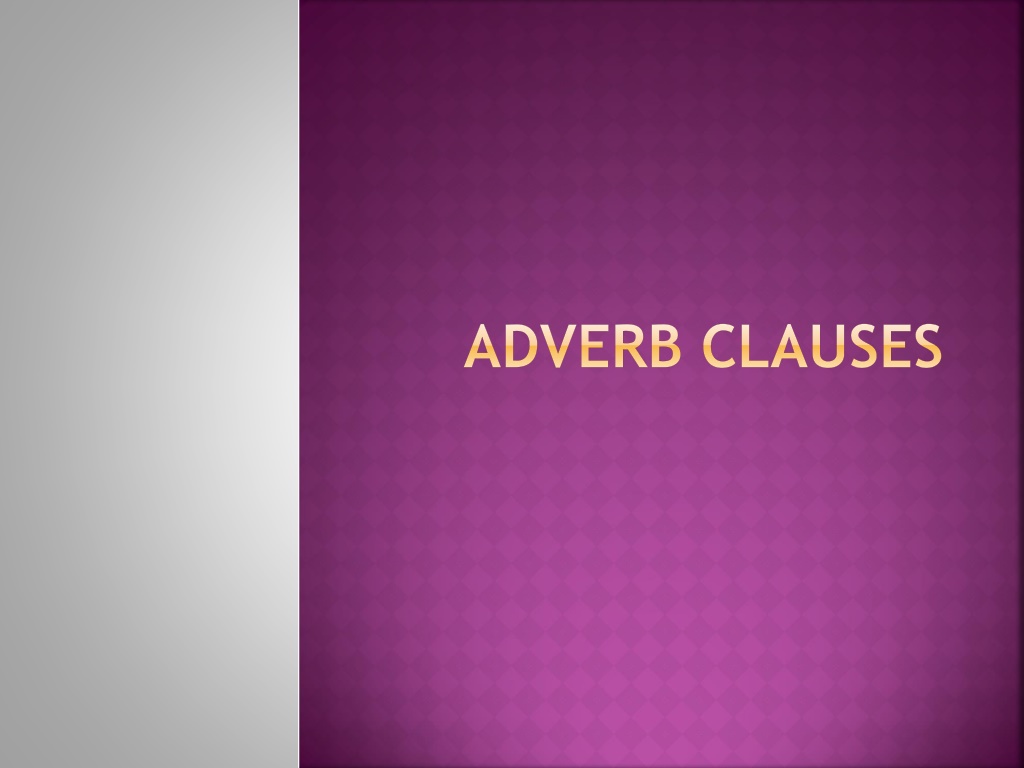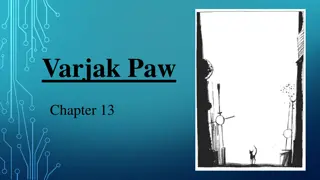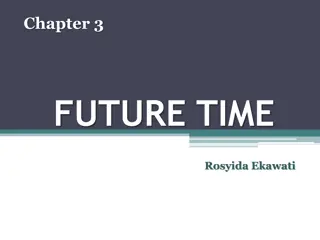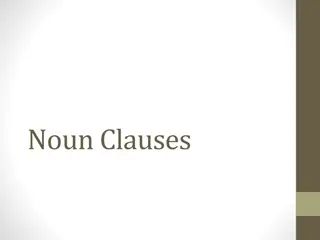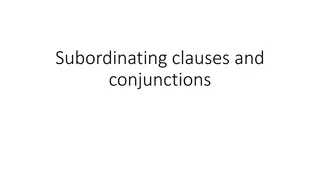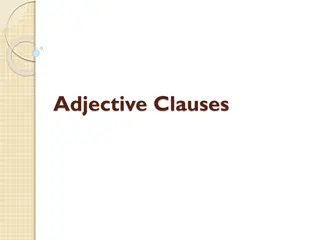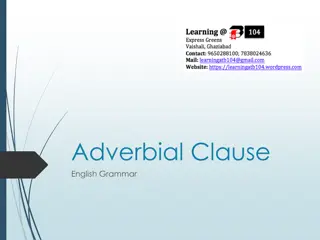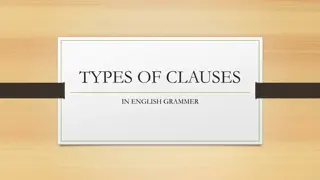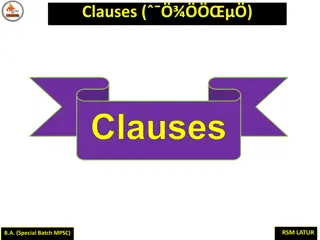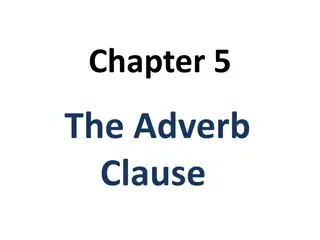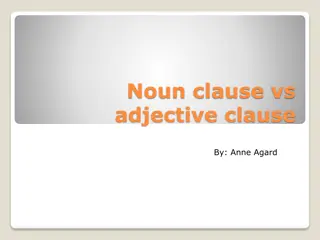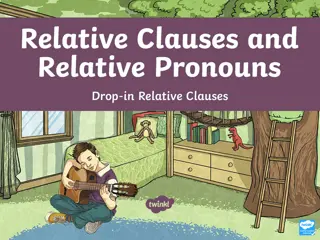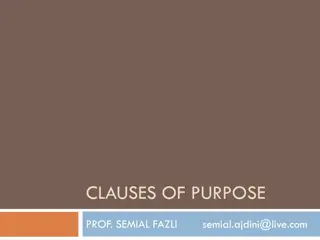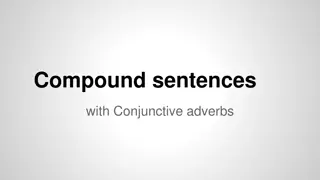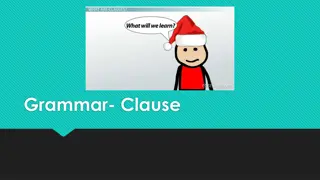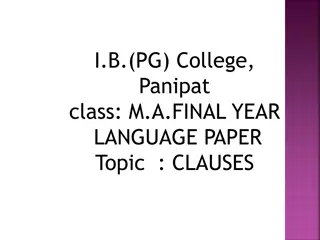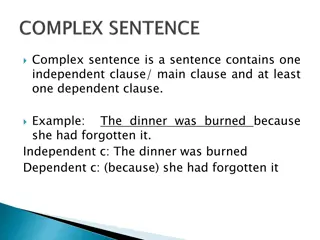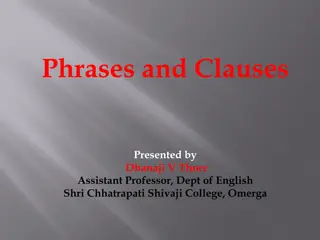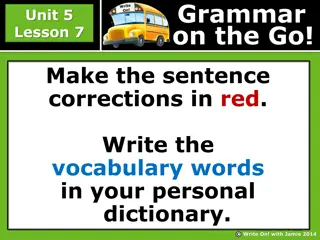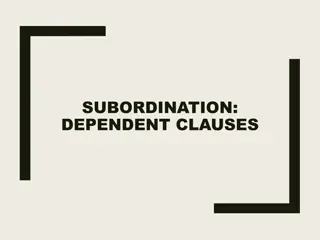Understanding Adverb Clauses: Usage and Examples
Adverb clauses help to establish relationships between ideas by indicating time, cause and effect, contrast, and condition. They are dependent clauses that must be connected to a main clause. Punctuation plays a key role in distinguishing between adverb clauses that precede or follow a main clause. Subordinating conjunctions are used to introduce adverb clauses, which can show time relationships, cause and effect, contrast, or condition.
Download Presentation

Please find below an Image/Link to download the presentation.
The content on the website is provided AS IS for your information and personal use only. It may not be sold, licensed, or shared on other websites without obtaining consent from the author. Download presentation by click this link. If you encounter any issues during the download, it is possible that the publisher has removed the file from their server.
E N D
Presentation Transcript
INTRODUCTION Adverb clauses are used to show relationships between ideas. They show relationships of time, cause and effect, contrast, and condition. adverb clause main clause (a) When the phone rang, the baby woke up (b) The baby woke up when the phone rang. In (a) and (b): when the phone rang is an adverb clause of time. Examples (a) and (b) have the same meaning.
PUNCTUATION: When an adverb clause precedes a main clause, as in (a), a comma is used to separate the clauses. When the adverb clause follows, as in (b), usually no comma is used.
(c) Because he was sleepy, he went to bed. (d) He went to bed because he was sleepy. In (c) and (d), because introduces an adverb clause that shows a cause-and-effect relationship.
INCORRECT PUNCTUATION: (e) When we were in New York. We saw several plays. ( f ) He went to bed. Because he was sleepy. Adverb clauses are dependent clauses. They cannot stand alone as a sentence in written English. They must be connected to a main (or independent) clause.
Summary list of words used to introduce adverb clauses which are called subordinating conjunctions. TIME After once while as soon as since the next time (that) by the time (that) when whenever as the first time (that) the last time (that) before as/so long as every time(that) until
CAUSE AND EFFECT Because now that since CONTRAST Even though although though DIRECT CONTRAST While CONDITION If unless Even if only if whether or not in case
USING ADVERB CLAUSES TO SHOW TIME RELATIONSHIPS after* ( a ) After she graduates, she will get a job. ( b ) After she (had) graduated, she got a job. before* ( c ) I will leave before he comes. ( d ) I (had) left before he came. A present tense, not a future tense, is used in an adverb clause of time, as in (a) and (c)
* After and before are commonly used in the following expressions: shortly after A short time after A little while after Not long after Soon after shortly before A short time before A little while before Not long before
When ( e ) When I arrived, he was talking on the phone. ( f ) When I got there, he had already left. ( g ) When it began to rain, I stood under a tree. (h ) When I was in Chicago, I visited the museums. ( i ) When I see him tomorrow, I will ask him. when = at that time Notice the different time relationships expressed by the tenses.
While / as ( j ) While I was walking home, it began to rain. ( k ) As I was walking home, it began to rain. while, as = during that time by the time ( I ) By the time he arrived, we had already left. (m) By the time he comes, we will have already left. by the time = one event is completed before another event Notice the use of the past perfect and future perfect in the main clause.
Since ( n ) I haven't seen him since he left this morning. ( o ) I ve known her ever since I was a child. since = from that time to the present In (o): ever adds emphasis. NOTE: The present perfect is used in the main clause.
Until/ till ( p ) We stayed there until we finished our work. ( q ) We stayed there till we finished our work. until, till = to that time and then no longer (Till is used more in speaking than in writing; it is generally not used in formal English.)
as soon as/ once ( r ) As soon as it stops raining, we will leave. ( s ) Once it stops raining, we will leave. as soon as, once = when one event happens, another event happens soon afterward as long as/ so long as ( t ) I will never speak to him again as long as I live. ( u ) I will never speak to him again so long as I live. as long as, so long as = during all that time, from beginning to end
Whenever/ every time ( v ) Whenever I see her, I say hello, (w) Every time I see her, I say hello. whenever = every time the first time/the last time/ the next time ( x ) The first time (that) I went to New York, I went to an opera. ( y ) I saw two plays the last time (that) I went to New York. ( z ) The next time (that) I go to New York, I m going to see a ballet.
Adverb clauses can be introduced by: first second the third, etc. time (that) last next etc.
Exercise 7, p. 369. 2. I left the room after I turned off the lights. 3. Before I left the room, I turned off the lights. 4. Whenever Suki feels nervous, she bites her nails. 5. The frying pan caught on fire while I was making dinner. 6. Just as we were sitting down to eat, someone knocked on the door. 7. The audience burst into applause as soon as the singer finished her song. 8. We have to wait here until Nancy comes. 9. As soon as Julia comes, we can leave for the theater. 10. Just as soon as my roommate walked into the room, I knew something was wrong. 11. Just before I stood up to give my speech, I got butterflies in my stomach. 12. The first time I saw the great pyramids of Egypt in the moonlight, I was speechless. 13. Since Lori started working at this company six months ago, she has gotten three promotions. 14. Once the weather gets warmer, we can start spending more time outside. 15. By the time Shakespeare died in 1616, he had written more than 37 plays. 16. The next time Sam goes to get his driver s license, he ll remember to take his glasses.
Exercise 9, p. 371. Sample answers: 1. Just after Judy returned to her car, she called the police. 2. Just as the police arrived, Judy began crying in frustration. 3. When Judy returned to her car, she discovered that her car had been broken into. 4. While Judy was buying jeans, a thief broke into her car. 5. By the time Judy returned to her car, the thief was gone. 6. As soon as Judy got back to her car, she called the police.
USING ADVERB CLAUSES TO SHOW CAUSE AND EFFECT Because (a) Because he was sleepy, he went to bed. (b) He went to bed because he was sleepy. An adverb clause may precede or follow the independent clause. Notice the punctuation in (a) and (b).
now that (c) Now that I ve finished the semester, I m going to rest a few days and then take a trip. (d) Jack lost his job. Now that he's unemployed, he can t pay his bills. Now that means because now." In (c): Now that I ve finished the semester means because the semester is now over. Now that is used for present causes of present or future situations.
since (e) Since Monday is a holiday, we don t have to go to work. ( f ) Since you re a good cook and I m not, You should cook the dinner. When since is used to mean because, it expresses a known cause; it means because it is a fact that or given that it is true that. Cause-and-effect sentences with since say, Given the fact that X is true, Y is the result." In (e): Given the fact that Monday is a holiday, we don t have to go to work."
(g) Since I came here, I have met many people. NOTE: Since has two meanings. One is because. It is also used in time clauses, as in (g). See Chart 17-2.
Exercise 13, p. 373. 3. Cold air hovers near the earth because it is heavier than hot air. 4. Since you paid for the theater tickets, please let me pay for our dinner. 5. Do you want to go for a walk now that the rain has stopped? 6. Because our TV set was broken, we listened to the news on the radio. 7. Many young people move to the cities in search of employment since there are few jobs available in the rural areas. 8. Now that the civil war has ended, a new government is being formed. 9. Since ninety-two thousand people already have reservations with an airline company for a trip to the moon, I doubt that I ll get the chance to go on one of the first tourist flights.
EXPRESSING CONTRAST (UNEXPECTED RESULT): USING EVEN THOUGH (a) Because the weather was cold, I didn't go swimming. (b) Even though the weather was cold, I went swimming. (c) Because I wasn t tired, I didn t go to bed. (d) Even though I wasn t tired, I went to bed. Because is used to express expected results. Even though is used to express unexpected results.* NOTE: Like because, even though introduces an adverb clause. *Although and though have basically the same meaning and use as even though.
Exercise 18, p. 375. 1. Yes. Even though I wasn t tired, I went to bed anyway. 2. No. Even though the phone rang many times, I didn t wake up. 3. Yes. Even though the food was terrible, I ate it anyway. 4. Yes. Even though I didn t study, I passed the test anyway. 5. No. Even though the weather is terrible today, I didn t stay home. 6. No. Even though I fell down the stairs, I didn t get hurt. 7. No. Even though I told the truth, no one believed me. 8. Yes. Even though I turned on the air conditioner, it s still hot in here. 9. No. Even though I mailed the letter a week ago, it hasn t arrived yet. 10. No. Even though I have a lot of money, I can t afford to buy an airplane. 11. Yes. Even though my grandmother is ninety years old, she is still young at heart. 12. Yes. Even though I didn t understand the joke, I laughed anyway.
SHOWING DIRECT CONTRAST: WHILE (a) Mary is rich, while John is poor. (b) John is poor, while Mary is rich. (c) While John is poor, Mary is rich. (d) While Mary is rich, John is poor. While is used to show direct contrast: this is exactly the opposite of that. * * Whereas can have the same meaning and use as while , but it occurs mostly in formal written English and occurs with considerably less frequency than while: Alary is rich, whereas John is poor.
Note the use of the comma in (a) and (b): In using while for direct contrast, a comma is often used even if the while-clause comes second (unlike the punctuation of most other adverb clauses). COMPARE: (e) The phone rang while I was studying. REMINDER: While is also used in time clauses and means during that time, as in (e).
EXPRESSING CONDITIONS IN ADVERB CLAUSES: IF-CLAUSES a) If it rains tomorrow, I will take my umbrella. If-clauses (also called adverb clauses of condition ) present possible conditions. The main clause expresses RESULTS . In (a): POSSIBLE CONDITION = it may rain tomorrow RESULT= I will take my umbrella A present tense, not a future tense, is used in an if- clause even though the verb in the if-clause may refer to a future event or situation, as in (a).*
Words that introduce adverb clauses of condition (if-clauses) if even if unless whether or not in case only if
SHORTENED IF-CLAUSES (a) Are you a student? If so / If you are, the ticket is half-price. If not / if you aren't, the ticket is full price. (b) It s a popular concert. Do you have a ticket? If so/ If you do, you re lucky. If not / If you don't, you re out of luck. When an if-clause refers to the idea in the sentence immediately before it, it is sometimes shortened. In (a): If so / If you are = If you are a student If not / If you aren t = If you aren t a student In (b): If so / If you do = If you have a ticket If not / If you don t = If you don t have a ticket
ADVERB CLAUSES OF CONDITION: USING WHETHER OR NOT AND EVEN IF Whether or not (a) I m going to go swimming tomorrow whether or not it is cold. OR whether it is cold or not. Whether or not expresses the idea that neither this condition nor that condition matters; the result will be the same. In (a): If it is cold, I m going swimming. If it is not cold, I'm going swimming. I don t care about the temperature. It doesn t matter.
Even if (b) I have decided to go swimming tomorrow. Even if the weather is cold. I m going to go swimming. Sentences with even if are close in meaning to those with whether or not. Even if gives the idea that a particular condition does not matter. The result will not change.
ADVERB CLAUSES OF CONDITION: USING IN CASE (a) I ll be at my uncle s house in case you (should) need to reach me. In case expresses the idea that something probably won't happen, but it might. In case means if by chance this should happen. NOTE: Using should in an adverb clause emphasizes the speaker s uncertainty that something will happen.
Exercise 30, p. 381. 2. In case you (should) need to see me, I ll be in my office tomorrow morning around ten. 3. In case you (should) need any more information, you can call me. 4. In case you (should) have any more questions, ask Dr. Smith. 5. In case Russ calls (should call), please tell him that I m at the library. 6. In case you aren t satisfied with your purchase, you can return it to the store.
ADVERB CLAUSES OF CONDITION: USING UNLESS (a) I ll go swimming tomorrow unless It's cold. (b) I ll go swimming tomorrow if it isn t cold. unless = if . . . not In (a): unless it s cold means if it isn't cold. Examples (a) and (b) have the same meaning.
Exercise 33, p. 382. 2. You can t travel abroad unless you have a passport. 3. You can t get a driver s license unless you are at least sixteen years old. 4. Unless I get some new batteries for my camera, I won t be able to take pictures when Laura and Rob get here. 5. You ll get hungry during class unless you eat breakfast.
ADVERB CLAUSES OF CONDITION: USING ONLY IF (a) The picnic will be canceled only if it rains. If it s windy, we ll go on the picnic. If it's cold, we ll go on the picnic. If it s damp and foggy, we ll go on the picnic. If it s unbearably hot, we ll go on the picnic. Only if expresses the idea that there is only one condition that will cause a particular result.
(b) Only if it rains will the picnic be canceled. When only if begins a sentence, the subject and verb of the main clause are inverted, as in (b).* No commas are used.
*Other subordinating conjunctions and prepositional phrases preceded by only at the beginning of a sentence require subject- verb inversion in the main clause: Only when the teacher dismisses us can we stand and leave the room. Only after the phone rang did I realize that I had fallen asleep in my chair. Only in my hometown do I feel at ease.
Exercise 37, p. 384. Part I. 2. you have an invitation. 3. you have a student visa. 4. chews gum 5. will go to the movie 6. the temperature reaches 32 F / 0 C. 7. will you pass the exam. 8. can you get into the soccer stadium. 9. can he watch TV in the evening. 10. will I have enough money to go to school. Part II. (Answers will vary.)
Exercise 38, p. 385. 2. I can pay my bills only if I get a job. I can t pay my bills unless I get a job. 3. Your clothes will get clean only if you use soap. Your clothes won t get clean unless you use soap. 4. I can take (some) pictures only if the flash works. I can t take any pictures unless the flash works. 5. I wake up only if the alarm clock rings. I don t wake up unless the alarm clock rings.
6. Eggs will hatch only if they are kept at the proper temperature. Eggs won t hatch unless they are kept at the proper temperature. 7. Borrow money from friends only if you absolutely have to. Don t borrow money from friends unless you absolutely have to. 8. Anita talks in class only if the teacher asks her specific questions. Anita doesn t talk in class unless the teacher asks her specific questions.
Exercise 39, p. 385. 1. Whether or not it rains, the party will be held outside/inside. 2. Even if it rains, the party will be held outside. Even if it doesn t rain, the party will be held inside. 3. In case it rains, the party will be held inside. 4. Unless it rains, the party will be held outside. 5. Only if it rains will be party be held inside. Only if it doesn t rain will the party be held outside.
